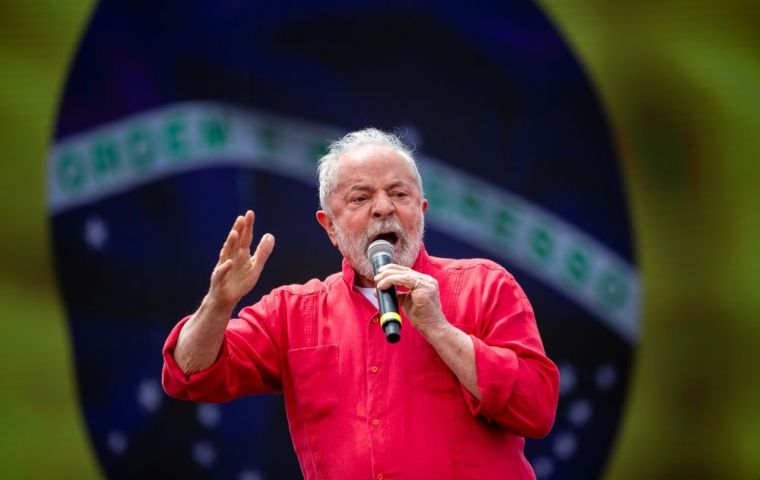MercoPress. South Atlantic News Agency
Lula intent in amending the Mercosur/EU trade agreement: EU pleased with its current wording
 In his victory speech on Sunday night, October 30th, Lula warned that he wants to “resume relations with the US and the European Union on a new basis.”
In his victory speech on Sunday night, October 30th, Lula warned that he wants to “resume relations with the US and the European Union on a new basis.” The first clash of the Brazilian president-elect with the European Union occurred, given Luiz Inácio Lula da Silva's anticipated intention to introduce modifications to the Mercosur/EU trade agreement, discussed for two decades.
In effect on the eve of the election runoff, the newspaper Le Monde published an article featuring a declaration of the president-elect in which he says that “improving the terms of the Mercosur-European Union agreement will allow us to increase commercial exchanges, deepen our bonds of trust and reinforce the defense of our common values.”
In his victory speech on Sunday night, October 30th, Lula warned that he wants to “resume relations with the US and the European Union on a new basis.” And that he was not interested in trade agreements that condemn Brazil to be an eternal supplier of commodities.
The EU responded to a request for comment from the Brazilian news agency Valor by emphasizing that the focus should be on implementing what has already been agreed upon.
Trade spokeswoman Mirian Ferrer said: “We believe that the agreement negotiated with Mercosur is beneficial for both parties and will lay the grounds for strengthening political and sectoral cooperation, trade, and sustainable development.”
She also added: “We look forward to engaging with Brazilian authorities, as well as other Mercosur countries, to bring the ongoing process to a successful conclusion. Furthermore, we seek to strengthen our cooperation on sustainability and deforestation through an additional legal measure.”
Lula’s idea, which would eventually entail reopening negotiations, had already been touched upon on a trip to Europe before the election campaign. According to sources, the president-elect thinks that Brazil should obtain more concessions, for example, in the field of manufacturing, and not limit itself to being a supplier of agricultural goods.
Notwithstanding, Brussels' position is that nothing changes. Europeans are still demanding an additional commitment against deforestation by the end of the year. According to sources in Brussels, this European document is still being formulated by the European Commission and has not yet been reviewed by the 27 member states.
Reopening the Mercosur-EU agreement after 20 years of complicated negotiations with interruptions means delaying an improvement in bilateral trade conditions for companies on both sides amid a particularly tense geopolitical scenario.
Mercosur and the EU are continuing to work on the technicalities of the bi-regional agreement, recently concluding topics such as geographical indication. However, nobody expects anything to happen anytime soon because the presidential transition team will be preoccupied with other matters.
In Brussels, the president of the European Commission, Ursula von der Leyen, in a recent speech to the European Parliament, did not even mention Mercosur when dealing with trade agreements. Instead, she said re-updating the agreements with Mexico and Chile, but those two aren’t taking off anytime soon.
According to Jair Bolsonaro’s administration, the Brazilian private sector has not asked to reopen what has already been negotiated with Europe. Instead, Argentina’s president, Alberto Fernández, wants to review the understanding due to the country’s economic fragility.
There is also a feeling in Brasília that the Europeans were wrong in not having closed the agreement with Mercosur immediately and in not having accelerated Brazil’s entry into the Organization for Economic Cooperation and Development (OECD).
According to government assessments, many leaderships in Europe have opposed setting stronger ties with Brazil in response to the internal demand for pushing more strict environmental standards. Now, European companies want to invest in Mercosur but do not enjoy the advantages that the inter-bloc agreement would provide, for example.




Top Comments
Disclaimer & comment rules-

Read all commentsTWIMC...
Nov 04th, 2022 - 01:35 pm 0I Tænk..., the EU should stay put in their “GARDEN” and leave the “JUNGLE” to them “WEEDS”...
At least until their “YANKEE GARDEN MASTERS” figure out how to uproot them “WEEDS”....
https://www.middleeasteye.net/opinion/eu-josep-borrell-europe-garden-built-on-plunder-jungle
Capisce...?
Commenting for this story is now closed.
If you have a Facebook account, become a fan and comment on our Facebook Page!